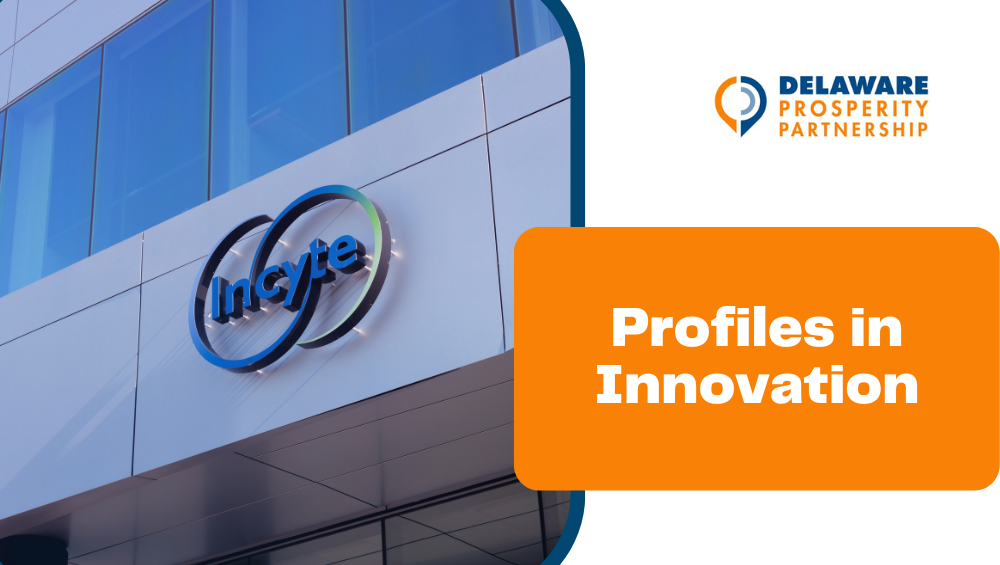Profiles in Innovation: Incyte
Profiles in Innovation: Incyte
Profiles in Innovation – Meet Global Biopharma Leader Incyte
In this series, Delaware leaders noted for innovation share insights on innovation. Incyte, the Delaware-based global biopharma leader, has experienced significant growth and expansion over the last two decades in its work to discover, develop and deliver breakthrough medicines for cancer, inflammatory, and autoimmunity diseases. President, Chief Executive Officer, and Chair of the Board Hervé Hoppenot shares what makes Delaware the ideal place for innovation. He also reflects on the importance of resilience, tenacity, and collaboration, especially when it comes to creating a dynamic environment that breeds innovations.
1. Why is Delaware a great state to be an innovator?
HH: At Incyte, we are happy to call Delaware home. Our roots go back to 2002 when we were founded by a small group of scientists who believed Delaware was the right place for drug discovery and development. Over the last two decades, we have received significant support from local leaders, which has helped facilitate our continued growth and expansion in the region, including a new state-of-the-art research facility that was opened this year. As the community in Delaware meaningfully embraces our work, we continue to innovate and are discovering and developing new medicines for patients right here in Wilmington. We are also driven to give back to this community that has given so much to us, and we are proud to have recently announced a five-year extension of the Incyte Cancer Care Assistance Fund for Delaware, which has provided financial assistance for Delaware cancer patients, their caregivers and family members since its inception in 2018.
2. In your view, what qualities should a successful innovator have?
HH: We believe the most powerful innovation comes from resiliency, tenacity and collaboration around a shared purpose. At Incyte, we exist to find meaningful, new solutions for patients around the world living with serious unmet medical needs. Everyone here – the Executive Team, scientists and administrators – all play a role in advancing our ability to find new solutions that can positively affect these patients’ lives. Beyond this, we believe successful innovation requires the sharing of ideas. Innovation happens when people mix. Our exceptional team of biologists and chemists work side-by-side in our labs each day and are just steps away from colleagues who help ensure our medicines get to patients who need them. This dynamic environment allows our employees to listen to and engage with one another, which helps us all breed innovation.
3. What advice would you give innovators just starting?
HH: Innovators must realize that challenges will come – there will be bad days and setbacks. However, breakthroughs take time and require patience. It is important to always keep the end goal in mind – approaching each day with resiliency and tenacity while seeking to make the world a better place. Additionally, innovators must surround themselves with inspiration and whatever tools are needed to achieve their goals. Innovation does not happen in a vacuum. At Incyte, we try to provide the environment innovators need to succeed. Oftentimes, it requires working cohesively with others toward a common goal.

Hervé Hoppenot, Chairman, President and Chief Executive Officer
Hervé Hoppenot joined Incyte in 2014 as President and Chief Executive Officer and was appointed Chairman of the Board of Directors in 2015.
During Mr. Hoppenot’s tenure, the company has tripled the number of clinical candidates in its portfolio, expanding beyond Oncology to include research and development in Inflammation & Autoimmunity. Under his leadership, revenue has increased by nearly 600%. With a goal to deliver medicines to patients worldwide, Incyte has expanded geographically and has operations in North America, Europe and Asia.
Prior to joining the global biopharma leader Incyte, Mr. Hoppenot was the President of Novartis Oncology. Before joining Novartis in 2003, Mr. Hoppenot started his career in 1983 with Rhone Poulenc, later known as Aventis, where he served in several senior roles of increasing responsibility, including Vice President of Oncology and Head of the U.S. Oncology business unit. Mr. Hoppenot holds a diploma from ESSEC Business School.
Newsletter Sign Up
Stay Up To Date With Delaware
